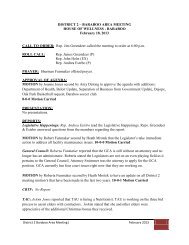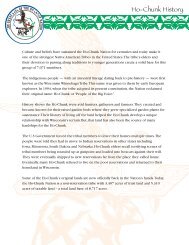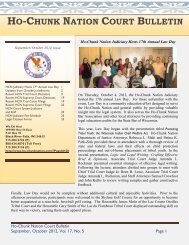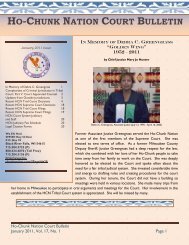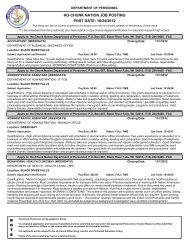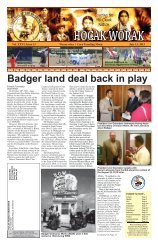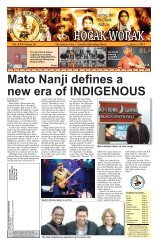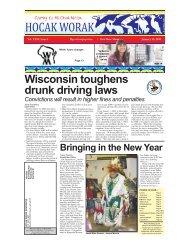The power of collaboration - Ho-Chunk Nation
The power of collaboration - Ho-Chunk Nation
The power of collaboration - Ho-Chunk Nation
Create successful ePaper yourself
Turn your PDF publications into a flip-book with our unique Google optimized e-Paper software.
PAGE 4 EDUCATION Ma\ hina\»u\ wira 25, 2010<br />
Educators address the<br />
Native drop-out rate<br />
John Kozlowicz<br />
Staff Writer<br />
Meeting at <strong>Ho</strong>-<strong>Chunk</strong> Convention<br />
Center on June 14-15,<br />
educators from throughout<br />
Wisconsin addressed an issue<br />
<strong>of</strong> vital concern in Indian<br />
Country: <strong>The</strong> educational<br />
challenges facing Native<br />
youth and why so many <strong>of</strong><br />
those youth are failing to meet<br />
those challenges.<br />
Organized by CREATE<br />
(Culturally Responsive Education<br />
for All: Training and<br />
Dr Susan Faircloth believes<br />
that Native students<br />
dropping out <strong>of</strong><br />
school is a national crisis.<br />
Enhancement) WISCONSIN,<br />
the conference focused on the<br />
“<strong>The</strong> Dropout/Graduation<br />
Crisis Among American Indian<br />
Students.”<br />
Data from 2006 indicates<br />
that in Wisconsin the estimated<br />
high school graduation<br />
rate among all students is 82<br />
percent. Among Native students<br />
the number drops to 55<br />
percent. Educators shared<br />
Eliza Decorah<br />
Staff Writer<br />
In a lifetime, many people<br />
struggle and go through different<br />
trials and tribulations.<br />
Despite a few bumps along<br />
the way, <strong>Ho</strong>-<strong>Chunk</strong> tribal<br />
member Kiana Beaudin finds<br />
inspiration and motivation<br />
with the help from her tutors,<br />
support from her family, and<br />
her own dedication to earn a<br />
diploma and graduate from<br />
UW-Madison’s Physician’s<br />
Assistant Program in May <strong>of</strong><br />
2010, and who is also a recent<br />
finalist for an Outstanding<br />
Student Award from the University<br />
<strong>of</strong> Madison.<br />
“She has overcome so<br />
many obstacles in her life and<br />
has come so far,” says long<br />
time friend and mentor, Tess<br />
Arenas, who nominated Kiana<br />
“for her hard work and dedication.”<br />
An only child, born in<br />
Madison, WI on February 19<br />
to Janice Lincoln and John<br />
Beaudin, she looked up to her<br />
parents but always found her<br />
dad to be her driving force.<br />
their thoughts and ideas on<br />
why the graduation rate is so<br />
low among Native students,<br />
the future consequences associated<br />
with the low graduation<br />
rate and what can be done to<br />
promote education in Native<br />
communities.<br />
Presenter Dr. Susan Faircloth,<br />
an enrolled member <strong>of</strong><br />
the Coharic Tribe, who currently<br />
serves as an Assistant<br />
Pr<strong>of</strong>essor <strong>of</strong> Educational<br />
Leadership at Penn State University<br />
believes that Native<br />
families and educators need to<br />
do a better job emphasizing<br />
that education does not replace<br />
tradition. “Tradition is<br />
my life. Education is my future,”<br />
is the message we<br />
should be sending our Native<br />
youth, she said.<br />
At a round table discussion,<br />
educators listed some <strong>of</strong> the<br />
reasons why they believe Native<br />
youth are not completing<br />
high school. Some <strong>of</strong> reasons<br />
given include; a lack <strong>of</strong> belonging,<br />
lack <strong>of</strong> role models<br />
(lack <strong>of</strong> Native teachers), lack<br />
<strong>of</strong> parental involvement or interest.<br />
Also cited was peer<br />
pressure not to do well and issues<br />
related to substance<br />
abuse and legal problems.<br />
Faircloth believes that while<br />
tribal government and public<br />
education <strong>of</strong>ficials frequently<br />
discuss the dropout crisis in<br />
Indian Country, not enough<br />
thought is given to the consequences<br />
associated with dropping<br />
out.<br />
Faircloth said that because<br />
the median age <strong>of</strong> Native<br />
Americans and Alaska Na-<br />
Kiana was a “daddy’s girl”<br />
and <strong>of</strong>ten referred to as her father’s<br />
shadow. At the young<br />
age <strong>of</strong> thirteen, Kiana was<br />
devastated when her father<br />
passed away from a rare form<br />
<strong>of</strong> skin cancer. Often times,<br />
Kiana would go to appointments<br />
with her father and was<br />
amazed at how the human<br />
body worked and how doctors<br />
were able to help with diseases.<br />
She was fascinated<br />
with the medical field and<br />
wanted to learn more.<br />
After 4 years <strong>of</strong> high school<br />
and cramming for college<br />
prep exams, Beaudin graduated<br />
from Madison Memorial<br />
High School where she<br />
earned a “Student <strong>of</strong> the<br />
Month Award.” She then attended<br />
Madison Area Technical<br />
College and later<br />
transferred to UW-Madison to<br />
attain her Physician’s Assistant<br />
degree.<br />
Trying to balance her social<br />
life with negative influences,<br />
work, and her education, she<br />
soon realized it took a lot <strong>of</strong><br />
hard work and dedication. By<br />
tives is younger than the general<br />
population, it is especially<br />
important to secure<br />
more positive educational outcomes.<br />
She noted “that a failure<br />
to ensure that Native<br />
youth graduate from high<br />
school places the entire population<br />
at risk.” <strong>The</strong> effects are<br />
readily evident, she said. For<br />
example, Native people without<br />
high school diplomas are<br />
less likely to join the workforce<br />
and those who do tend<br />
to be employed in more service<br />
oriented than pr<strong>of</strong>essional/managerial<br />
level jobs.<br />
<strong>The</strong>se jobs are much more<br />
likely to lack the benefits and<br />
pay needed to support a family.<br />
Among the other consequences<br />
is a large gap in<br />
home ownership that is<br />
strongly related to educational<br />
and income levels, she<br />
warned.<br />
Across the United States,<br />
Indian gaming has created<br />
new opportunities for Native<br />
people and Faircloth stressed<br />
that education is needed for<br />
tribal members to take full advantage<br />
<strong>of</strong> these opportunities.<br />
Noting that Indian<br />
children are being held accountable<br />
for something that<br />
is out <strong>of</strong> their control, <strong>of</strong>ten<br />
because <strong>of</strong> the financial<br />
strains placed on local school<br />
boards, Faircloth warns the<br />
educational trend must be reversed.<br />
At a time when students<br />
are being told that if<br />
they just worked harder they<br />
would succeed, Faircloth believes<br />
the schools themselves<br />
need to be held more account-<br />
her second semester at<br />
MATC, she had to withdraw<br />
because she started to fall behind.<br />
Having a hard time finding<br />
motivation in her<br />
prerequisite courses, procrastination<br />
became one <strong>of</strong> her favorite<br />
past times.<br />
Life soon changed for<br />
Kiana when she found out she<br />
was pregnant. Beaudin knew<br />
she had to be more responsible<br />
and she also wanted to<br />
provide a stable life for her<br />
son. With more dedication<br />
than ever, Kiana went back to<br />
school.<br />
With direction from a<br />
school advisor for the Physician’s<br />
Assistant program,<br />
Beaudin made it and is on her<br />
way to a better life as a single<br />
mother with a Physician’s Assistant<br />
degree. Although<br />
some courses were very frustrating<br />
and discouraging at<br />
times, she pushed herself forward<br />
through tutoring help<br />
from the Academic Advancement<br />
Program (AAP) which<br />
placed her in a Scientific<br />
Scholars Program.<br />
able in solving the education<br />
crisis in Indian Country.<br />
In a report written earlier<br />
this year with co-author John<br />
Tippeconnie III, Faircloth expressed<br />
what she believes<br />
needs to be done. “Policy<br />
makers, budget appropriators,<br />
school boards, superintendents,<br />
principals, teachers,<br />
counselors, tribal leaders and<br />
other stakeholders must take<br />
action and demand that this<br />
crisis be halted. No longer<br />
can we sit back and wait for<br />
change to happen. Failure to<br />
respond to this crisis will have<br />
disastrous consequences for<br />
native peoples across the nation,<br />
including a widening social<br />
and economic gap<br />
between American Indians,<br />
Alaska Natives and the larger<br />
population, a real and immediate<br />
threat to the self-sufficiency<br />
<strong>of</strong> tribal peoples and<br />
their nations. This is a national<br />
crisis that must be addressed<br />
now,” she wrote.<br />
During the conference, Faircloth<br />
identified some strategies<br />
that she believed if used<br />
properly, could decrease the<br />
dropout rate and increase the<br />
graduation rate among Native<br />
students. Referring to studies<br />
done by E.A. Brandt and Jon<br />
Reyhner, she urged educators<br />
in policy makers to:<br />
• Review and revise school<br />
policies and avoid implementation<br />
<strong>of</strong> policies that exclude,<br />
repress, demean, embarrass,<br />
harass or alienate Native students.<br />
• Make schools physically,<br />
mentally and emotionally safe<br />
As Kiana reflects back on<br />
her life thus far and the obstacles<br />
she has been able to overcome,<br />
she finds it fitting that<br />
before when her father was<br />
her driving force, her four<br />
year old son named after her<br />
father, John Beaudin II, fills<br />
his grandfather’s shoes and is<br />
by working to end racism,<br />
sexual harassment and other<br />
forms <strong>of</strong> physical and emotional<br />
assault.<br />
• Demonstrate an ethic <strong>of</strong><br />
care and concern for students.<br />
• <strong>Ho</strong>ld high expectations for<br />
students and challenge them<br />
to succeed.<br />
• Avoid the use <strong>of</strong> negative<br />
stereotypes.<br />
• Recognize that not all students<br />
perform or achieve the<br />
same.<br />
• Avoid blaming students or<br />
their parents and families for<br />
their academic failure or the<br />
low performance <strong>of</strong> the<br />
school.<br />
• Actively involve parents<br />
and families in schools and<br />
communities.<br />
• Individualize instruction<br />
and work to actively engage<br />
students in the learning<br />
process.<br />
• Provide opportunities for<br />
students to be immersed in<br />
their Native language and culture<br />
and develop and implement<br />
culturally appropriate<br />
and relevant curricula.<br />
• Prepare educators to work<br />
with native students. This includes<br />
pre-service as well as<br />
in-service pr<strong>of</strong>essional development<br />
opportunities.<br />
• Use tests and assessments<br />
as a means <strong>of</strong> supporting and<br />
assisting students rather than<br />
as a means <strong>of</strong> promoting failure.<br />
Learning from the Menominee<br />
School District:<br />
Also in attendance were<br />
Continued on Page 6<br />
Motivation, dedication,<br />
and a lot <strong>of</strong> hardwork<br />
A proud mother, Janice Lincoln, with her finalist honoree<br />
daughter, Kiana Beaudin.<br />
now her driving force.<br />
With a sigh <strong>of</strong> relief, Kiana<br />
now looks forward to spending<br />
quality time with her family,<br />
as well as travelling, and<br />
maybe putting on her fancy<br />
dance gear and attending a<br />
few pow-wows.



